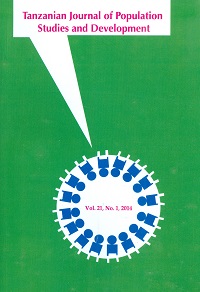Politics of the Poverty Shock in Developing Countries
Abstract
The ancient Greeks conceived of development as an immanent and cyclical movement towards and from the fulfilment of a potential. It implied a natural and intransitive process within an entity which an agent cannot impose on an object. This view of development began to change when Europeans considered it their burden to civilize Africans after five hundred years of their enslavement of the same Africans. It ended in 1949 when President Truman ' s ' Point Four ' reinvented development as a transitive process that an agent can perform on an entity, and called for investment of the inexhaustible technical knowledge and capital available in the developed world in the underdeveloped area of the globe. Despite the invention of development to eradicate poverty, famine and endemic hunger constitute the plight of scores of millions of people in the world. This article supports the view that the architects and adherents of the invention of the development have so paid lip service to eradication of poverty that development has become a process for making the rich richer and the poor poorer. It discusses the political definition and measurement of poverty, the causes of poverty, the politics and strategies advanced for solving the poverty problem, and explains why development has failed to eradicate poverty in the third world. Instead of being eradicated, poverty has been politicized in both developed and developing countries with liberal democracy and the market ideology as part of the problem rather than part of the solution. The scenario is such that expecting the rich nations to help eradicate poverty in the third world is similar to expecting the blind to lead the blind, for even in the rich countries, liberal democracy and the market have failed to eradicate poverty.
References
Allahar, A. 1989. Ideology, Social Order, and Social Change. in L. Tepperman and R.J. Richardson (Eds.), The Social World: An Introduction to Sociology. Toronto: McGraw-Hill Ryerson.
Alstman, D. 2002. Nation ' s Unemployment Rises to 5.8 percent. New York: New York Times, January 5, 2002, internet edition.
Andreski, A. 1975. A Reflection on Inequality. London: Croom Helm.
Arrow, K. 1963. Social Choice and Individual Values. New Haven: Yale University Press.
Black, M. 2002. No-Nonsense Guide to International Development. Toronto: Between the Lines.
Blackburn, R.M. 1999. Understanding Social Inequality. International Journal of Sociology and Social Policy. 19,9/10/11, 1999.
Bird, M. 2001. Dried Out. Time Magazine, 157, 18, May 7, 2001.
Boas, M. and Mcneill, D. Multilateral Institutions, A Critical Introduction. London: Pluto Press
Callinicos, A. 2000. Equality. Cambridge, UK: Polity.
Coleman, J. 1958. Nigeria: Background to Nationalism. Berkeley: University of California Press.
Danker, S. 1999. Global Cohort of Poverty Increases. Earth Times, 8, 15, August 16-31.
Dhanani, S., & I. Islam. 2002. World Development, 30, 7, 2002.
Dwyer, P., & D. Seddon. 2002. The New Wave? A global Perspective on Popular Protest. Paper presented at the 8th International Conference on Alternative Futures and Popular Protest, Manchester, UK, April 2002.
Evans, E.B., D. Long. 1997. Development, in Joseph N. Weatherby (Eds.) The Other World, White Plains: Longman, 1997: 51-52.
Friedman, T.L. 2000. The Lexus and the Olive Tree. New York: Anchor.
Johnson, David. 2002. Thinking Government. Peterborough: Broadview Press.
Kapur, D. 1999. The IMF: A Cure or a Curse? Cooperation South, 1, 1999.
Khapoya, V. 1998. The African Experience. Upper Saddle River: Prentice-Hall.
Kim, M. 1999. The Working Poor: Lousy Jobs or Lazy Workers? In L. Kushnick & A. Jennings (Eds). A New Introduction to Poverty: The Role of Race, Power, and Politics. New York: University Press
Mason, M. 1997. Development and Disorder. Toronto: Between the Lines
Neiman, M. 2000. Defending Government. Upper Saddle River: Prentice Hall.
Osabu-Kle, D.T. 2000. Compatible Cultural Democracy: The key to Development in Africa. Peterborough: Broadview Press.
Palmer, M. 1997. Political Development, Dilemmas and Challenges. Itasca: Peacock
Rahman, A. 1999. Women and Microcredit in Rural Bangladesh: Anthropological Study of Rhetoric and the Realities of Grameen Bank Lending. Boulder, CO: Westview Press.
Ravallion, M. 2001. Growth, Inequality, and Poverty: Looking Beyond Averages: Washington DC: World Bank:
Rist, G. 2002. The History of Development. New York: Zed Books.
Robinson, S. 2002. Scarred. Time Magazine, 160, August 3, 2002.
Rodney, W. 1982. How Europe Underdeveloped Africa. Washington DC: Howard University Press.
Room, G. 1993. Antipoverty Action Research in Europe. Bristol: SAUS Press.
Sen, A. 1990. Food Entitlements and Economic Chains. In Hunger in History. LF. Newman (ed). Oxford: Basil Blackwell.
Shafritz & Russell. 2000. Introducing Public Administration. New York: Longman.
Shields , J. & M. Evans. 1998. Shrinking the State. Halifax: Fernwood Publishing.
Stiglitz, J.E. 2002. Globalization and its Discontents. New York: Norton.
UNDP. 1998. Overcoming Human Poverty. New York: University Press.
United Nations. 1995. Poverty and the Environment. New York: University Press.
United States Government. 1949. Public Papers of the Presidents, January 20, 1949.
World Bank. 2001. Attacking Poverty. Washington DC: Oxford University Press.


